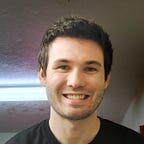What I’ve Learned In My Career Switching Journey To Software Development: Part 1
An introduction, and what your first course should be.
In November of 2020 I decided I needed a new career. I was 27 years old at the time and had been coaching gymnastics since I was 15 years old. Slowly over time I realized it wasn’t going to last. Don’t get me wrong, coaching was an incredibly fun, engaging, and unique career. There is nothing quite like it and I will always miss it. However, the cons for me started to outweigh the pros. Most notably, the pay isn’t the greatest and my body was breaking down from spotting all day long. The long term outlook wasn’t looking too great for me. Deciding to switch careers has been a long and difficult journey, with some successes and some mistakes made along the way, so I thought it would be a good idea to share what I’ve learned for someone deciding it’s time for their career switch as well.
Where I Started And Where You Should Too
When I first started looking at potential new careers, I was overwhelmed with the different possibilities. After many google searches researching different careers, and looking at countless threads and articles to try and figure out which career would fit my personality and talents, while also paying enough, I decided to give Software Development a chance. I found an online and free intro to CS course so that I could see if programming would be something I would enjoy. Starting with this course was the best thing I could have done, and I recommend anyone start with this course above any other intro courses that I’ve tried.
That course was Harvard University’s CS50: Introduction to Computer Science. This course is the perfect way to tell if Software Development may be for you. If the information you learn about in the lectures is interesting to you, and you get excited about doing the problem sets and completing them successfully, then I would say programming could be for you. If you don’t enjoy this course, then I would recommend trying a different career.
There are so many reasons why I highly recommend this course, including:
- The lecturer is very enjoyable to learn from, and he explains the concepts in the lecture so well that makes it so much simpler to understand compared to some other courses/tutorials I’ve seen.
- They provide extra resources on top of the weekly lecture, including detailed notes about all the information learned in the lecture, as well as supplemental videos to take a deeper dive into the topics discussed.
- The problem sets are very challenging, but fair. They are directly related to the topics discussed in the weekly lecture, but they only give you just enough information where you have the tools you need to solve the problem. There’s still a requirement to have great problem-solving skills and the ability to put those tools together in order to be successful. You will fail multiple times and constantly be going back to the notes to remind yourself what you were taught, but when you have finally finished the problem set, your understanding of that material will be so much greater compared to if they had just had you do a follow-along or a simple problem.
- They go over a variety of programming languages and introduce different areas of computer science. This can be helpful for you to figure out which job in CS you might be interested in, or which programming language you enjoy working with.
- They have follow-up courses that take a deeper dive into more specific areas of CS/Software Development. These include Artificial Intelligence, Game Development, or Web Programming.
What’s Next In This Series?
This is the first of many articles I plan to write about all the different things I’ve learned when it comes to choosing Software Development as a career. I’m going to go over all the different options you can take after CS50, what factors to consider in which path you choose, what other technologies to learn besides programming languages, the best options for people who are post-bacc with a major unrelated to Computer Science (like me), and more! Stay tuned!
